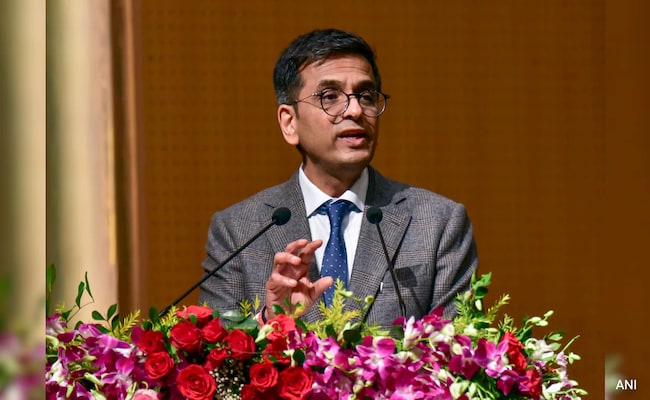Constitution Is A “Powerful Tool” To Curb Disparities: Chief Justice


The CJI said the bottom line was that “we live among many such complexly stacked inequalities.” (File)
New Delhi:
Chief Justice of India D Y Chandrachud on Wednesday said the Constitution is a “powerful tool” to curb disparities and it creates institutions and structures which are meant to guard against inequality.
He said the Constitution provides for checks and balances within these institutions and also stipulates institutional priorities and obligations towards citizens of the country.
Addressing a gathering at the 13th convocation ceremony and founder’s day of the O P Jindal Global University here, the CJI exhorted the students to spot injustice in all its facets in the world around them.
“The Constitution is a powerful tool to curb such disparities. It creates institutions and structures that are meant to guard against inequalities – apparent or invisible,” he said.
“In that sense, it performs a horizontal function – in that it regulates the inter-institutional relationships; and a vertical function – in so far as it regulates the relationship between the State and the people. But this is not all. The Constitution does a lot more than that, it entrenches these values into our social fabric,” Justice Chandrachud said.
He said constitutional theorists attribute stability of democracies to stability of their founding principles.
“However, something we take for granted in our democracy is the stability that our Constitution affords to our civic lives. Constitutional longevity speaks to the wisdom of our framers who were prescient enough to incorporate grounding elements into the Constitution without making it into a rigid normative, and thus a brittle document,” he said.
The CJI said the Constitution, while being a sturdy foundation for our democracy, is also sufficiently flexible.
“For instance, we may understand that inequality is unjust. But we may have diverse ideas of what equality entails. Does similarity of treatment always promote equality or does it sometimes stray us further away? Does the law only target manifest inequality or inequality that lurks in shrouds of protective discrimination and non-interference?” he said.
He said for instance, the law proscribes discrimination on the ground of sex.
The CJI said a law that prohibits women employees to work in certain establishments, apprehending threats to their security is not prima facie malignant.
“Workplace security is a rather laudable legislative objective. However, notice how a seemingly beneficial law effectively clips the wings of women who seek to be employed in some of these establishments. Such a law would not pass constitutional muster because it furthers stereotypical assumptions and perpetuates gender roles in a workplace,” Justice Chandrachud said.
He said in reality, justice means different things in different contexts and it takes a compassionate eye to spot injustices around them.
The CJI said the bottom line was that “we live among many such complexly stacked inequalities”.
“And there are no straightjacket or strictly legal solutions to some of these problems. The solutions, like the issues themselves are nuanced. They require a compassionate, sincere professional solution, which you are all now capable of devising,” he said.
He said problems like climate change, information gap and unequal distribution of basic resources do not have clear solutions neatly boxed in one professional domain or institution and their answers lie in exploration and cooperation.
“In finding the best solutions, we must not be dictated only by concerns of expediency, rationality and pragmatism. Finer strands of accessibility, inclusivity and diversity must be woven into the decisions we make,” the CJI said.
He said our social order was not necessarily perfect in all respects and sometimes, “our present problems may compound with underlying imperfections”.
“This entrenches pre-existing inequalities. Their impact is not only imminent and harmful, but also disparate,” he said. Justice Chandrachud also implored the students to spend their days and lives not only as ambassadors of their alma mater, but also as the voices of reason in a clutter of noise.
“The danger to our societies today is the clutter of noise and we need the voice of reason among the voices of unbridled passion,” he said.
“Take it from a judge who sits through long and cognitively taxing hours of courtroom-conversation, a voice of reason and sincerity resonates loud and clear. You must incorporate the spirit of the Constitution in all that you do,” he said.
Justice Chandrachud told the students that each one of them possesses the caliber to bring transformative change in their areas of expertise.
“The first step in recognising that is seeing yourselves as stakeholders in the diversity and well-being of society,” he said, adding, “Even as Supreme Court judges, we spend all our time learning, unlearning and relearning different ways to approach the law and different interpretations”.
(Except for the headline, this story has not been edited by NDTV staff and is published from a syndicated feed.)




